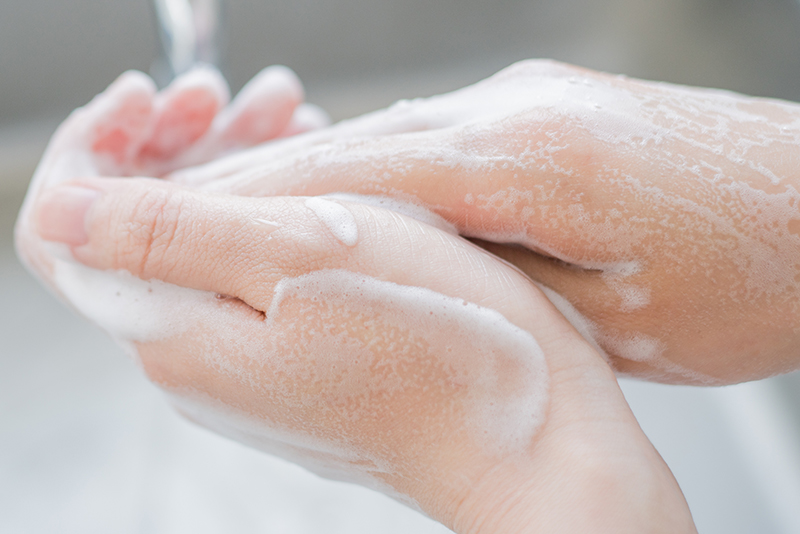You’ve heard the mantra – “Wash your hands!” Every health organization around the world has been reciting this mantra for what seems like forever. Just why is hand hygiene so important? Washing your hands is one of the easiest and most important things you can do to stay healthy and stop the spread of bacteria and viruses such as colds and flu and even COVID-19. After all, most of us were taught as young children to wash our hands before we eat and after we use the bathroom, weren’t we?
How does a virus on my hands lead to an infection in my body?
Every health professional will tell you when you rub your eyes or touch your nose or mouth, any viruses on your hands can enter your body through mucous membranes in your eyes, nose or mouth. So, think about all the things you touch every day – doorknobs, elevator buttons, door handles, ATMs, touchscreens, your cellphone (and all the surfaces it has touched) – just to name a few! When you touch these objects, any viruses that are able to survive on these surfaces may be transferred to your hands. Whether you realize it or not, it’s estimated that people touch their face at least 23 times an hour.
This is why washing your hands is so important.
Do’s of Hand Washing
- Remove jewellery such as rings
- Wet hands up to the wrists. Temperature is not important as long as you use clean, running water
- Apply enough soap to cover hands including the back of your hands and your wrists
- Work soap under fingernails and around and between joints and fingers for a minimum of 20 seconds
- Rinse off all lather with water
- Dry hands with a clean cloth or paper towel - take special care to dry thoroughly between fingers
- Turn off the tap with a paper towel or cloth so that you don’t recontaminate your hands.
Do I need to use anti-bacterial soap?
There is no proof that using consumer-labeled “antibacterial” soap is better at preventing illness than ordinary soap and water. Actually, all soap is antibacterial. And because germs you are exposed to include viruses, it makes even less sense to worry about “antibacterial” labeled soap.
Should I use hand sanitizer?
If you do not have access to water, use a hand sanitizer with at least 60 percent alcohol.
- Remove any visible dirt, as best you can
- Place enough alcohol-based hand rub into the cupped palm of one hand sufficient to wet both hands completely
- Rub the liquid into the palms, backs of hands, between fingers and under nails
Won't frequent hand hygiene dry my skin?
Intact skin is the first line of defence against microorganisms, hence it is important to maintain good skin care. To prevent chafing, wet your hands before applying soap and use a mild soap with warm water; pat rather than rub hands dry; and apply lotion liberally and frequently.
Most alcohol-based hand rubs contain emollients to reduce the incidence of skin irritation. Frequent use of alcohol-based hand rub actually lessens the incidence of skin breakdown, as it does not subject hands to the friction and abrasion involved in hand washing and drying hands.
Don'ts of Hand Washing
- DON'T leave hand jewellery on when performing hand hygiene. Jewellery is very hard to clean and hides bacteria and viruses from the mechanical action of the washing/rubbing.
- DON'T use artificial nails, nail enhancements or long (>3-4mm) nails, as they trap bacteria and are difficult to keep clean.
- DON'T wear chipped nail polish, as bacteria may become trapped along the edges
- DON'T use a common hand towel.
- DON'T use sponges or non-disposable cleaning cloths. Remember that germs thrive on moist surfaces.
Just what does often mean?
So, now that you know the do’s and don’ts of hand washing, when should you practice hand washing?
- When they are visibly dirty
- Before preparing and immediately after handling food
- Before eating
- After using the toilet
- After contact with contaminated surfaces (e.g., garbage bins, cleaning cloths)
- After handling pets and domestic animals
- After wiping or blowing one's nose, handling soiled tissues, or sneezing into one's hands
- After contact with blood or body fluids (e.g., vomit, saliva)
- Before and after dressing wounds
- Before and after giving care or visiting someone who is ill or who is less able to fight off infections (e.g., someone with diabetes or cancer)
- Before preparing and taking medication
- Before inserting and removing contact lenses
Sources:
Public Health Agency of Canada –
https://www.canada.ca/en/public-health/services/healthy-living/hand-hygiene.html
Infection and Prevention Control Canada
